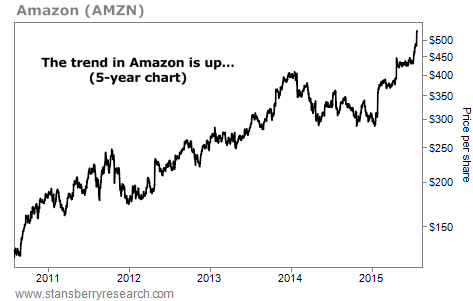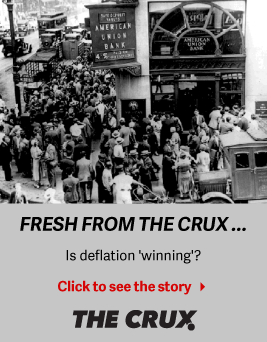| Home | About Us | Resources | Archive | Free Reports | Market Window |
|
Editor's note: Today, we're sharing a piece of timeless wisdom from our friend Chris Mayer. Below, Chris explains why great investors ignore the news...
Three Reasons Why the News Is Bad for YouBy
Wednesday, July 29, 2015
I don't write a lot about the news. I'm more likely to write about an old book I read or my travels than what is in the headlines of the world's media outlets. This is partly by design.
Paying too close attention to the news could hurt your returns – and will certainly keep you from ever earning 100 times on a stock. Most "news" you can safely ignore.
Here are three reasons why the news is bad for you...
1. The News Makes You Trade Too Much
A psychologist named Paul Andreassen ran a number of experiments in the 1980s. He showed, as journalist Jason Zweig writes, "paying close attention to financial news can lead investors to trade too much and to earn lower returns than those who tune out the news."
The trick is to be well-informed yet coolly detached. Don't let news events – like the market crash in China or the Greek debt crisis – dictate your buy and sell decisions. To make a really great return on a stock, you have to sit with it and let the magic of compounding do its thing.
That's hard to do if you're freaked out about what's in the headlines.
2. The News Is About What Already Happened
There's another problem with the news. It's about what already happened. Successful investing, though, isn't about what has happened. It's about what's going to happen.
I give you an example of newsy thinking from a recent Wall Street Journal article. Writer John Carney writes about Bank of America's earnings report. He says Bank of America is not cheap. He notes that it trades for a discount compared with JPMorgan's stock. Yet "the difference maps almost exactly the gap between [Bank of America's] 8.75% return on equity and JPMorgan's 11%."
In other words, Bank of America is not as profitable as JPMorgan and deserves a discount. Fair enough, but here's where Carney errs. He writes, "So while [Bank of America] is sailing in the right direction, it doesn't yet deserve a place at the front of the big-bank regatta."
Carney implies that you want to buy Bank of America when its profitability equals that of JPMorgan. That's not the way good investors think. If you wait for that, Bank of America's stock will be a lot higher. A good investor would own Bank of America on the thesis that Bank of America will close the gap. It doesn't make any sense to wait until you can see it in the numbers. By that time, the opportunity will have passed.
3. The News Can Be Wrong
This last one is my favorite. The financial news often gets things wrong or at least presents events in a misleading way. The best example of this is to look at any daily summary of the previous day's market action. There is always a reason, or reasons, given for the market's move that day. They can't say, "We don't know," even though that would be the right answer.
The truth is that it's mostly random. Let me quote from investment guru Martin Sosnoff's book Master Class for Investors. He's writing about a 100-point down move in the Dow:
The financial media's 24/7 world can't admit that. And so you see a lot of made-up narratives, awful abuse of statistics, mixed-up cause-and-effect analysis and flat-out misunderstandings. For an example of the last one, let's look at Greece. I could write this whole essay about the idiotic things people have written about the Greek crisis. For one example, I turn to a recent Gene Epstein column in Barron's. He writes: "A similar financial calamity could happen here." He then goes on to cite debt-to-gross domestic product (GDP) ratios of Greece and compares them to the U.S's.
Epstein seems to have no idea how these monetary systems work. A comparison between the two isn't relevant at all. Greece does not issue its own currency. The U.S. does. Put another way, Greece can run out of euros. The U.S. can never run out of dollars.
Is it logical, then, to compare the two? No.
The U.S., the U.K., and Japan are all examples of sovereign issuers of their own money. Eurozone countries are not. The "debts" of the U.S., U.K., and Japan have zero credit risk. Each government can pay all of the obligations at par. No eurozone country can make that claim. Not even Germany. German bonds may be low-risk, but they are not free of credit risk in the way U.S., U.K., and Japanese bonds are.
Thought of this way, does it even make any sense to refer to the U.S. government as having to "borrow" dollars? No. If you create your own money, you don't need to borrow it to spend it.
It seems simple, but lots of people get it wrong. The bottom line here is you can't trust what you read in the news.
The financial media live by the fiction that something important is happening every day, every hour of every day, and every minute of every hour. And if you avert your gaze, you'll miss something important... and it will cost you.
Fortunately, all this nonsense leaves fortune's door slightly ajar. It means there are a lot of people just reacting to today's news and prices. It means there are a lot of people who aren't paying attention to the merits (and demerits) of individual businesses.
Which means there are wonderful opportunities for those of us who do still think about individual businesses, and who are able to tune out the day-to-day noise.
Regards,
Chris Mayer
Further Reading:
You can find more of Chris' insights in DailyWealth right here:
"I know you have no interest in holding stocks for 80 years. That doesn't mean we can't learn something from this story... "
"As an investor in stocks, there is a safe path through a deflationary ice age."
"It's an inspiring tale... and if you take its wisdom to heart, you'll be ahead of 99.9% of your fellow investors... "
Market NotesTHE INCREDIBLE UPTREND IN AMAZON Today's chart highlights the impressive price action in shares of online retailer Amazon.
Since launching in 1995, Amazon has transformed its business from an online bookstore into a one-stop shop for all retail products. Today, the company sells more than 200 million items, including everything from food to furniture. Amazon has its own popular e-book reader and is the No. 1 provider of "cloud computing" services in the world.
While the majority of retail is still done in brick-and-mortar stores like Wal-Mart and Target, Amazon has all but cornered the online retail market. Its Amazon Prime service quickly delivers goods to nearly 50 million people across the U.S. The Wall Street Journal reports that the company does more in sales than its next dozen competitors combined.
Last week, shares rose nearly 15% in one day after the company reported strong earnings, hitting a new all-time high. Shares are up more than 350% over the past five years as Amazon continues its long-term move higher...
 |
Recent Articles
|



